【英语教学】《新目标英语》七年级英语下册知识点归纳
七年级下册英语知识点复习完整版
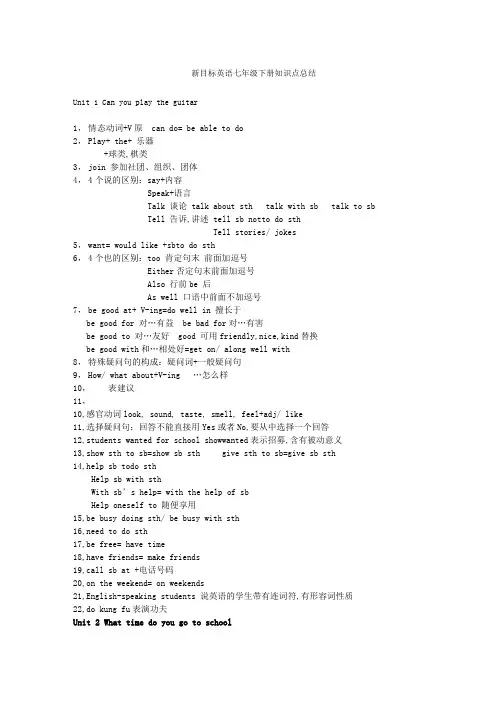
新目标英语七年级下册知识点总结Unit 1 Can you play the guitar1,情态动词+V原 can do= be able to do2,Play+ the+ 乐器+球类,棋类3,join 参加社团、组织、团体4,4个说的区别:say+内容Speak+语言Talk 谈论 talk about sth talk with sb talk to sb Tell 告诉,讲述 tell sb notto do sthTell stories/ jokes5,want= would like +sbto do sth6,4个也的区别:too 肯定句末前面加逗号Either否定句末前面加逗号Also 行前be 后As well 口语中前面不加逗号7,be good at+ V-ing=do well in 擅长于be good for 对…有益 be bad for对…有害be good to 对…友好 good 可用friendly,nice,kind替换be good with和…相处好=get on/ along well with8,特殊疑问句的构成:疑问词+一般疑问句9,How/ what about+V-ing …怎么样10,表建议11,10,感官动词look, sound, taste, smell, feel+adj/ like11,选择疑问句:回答不能直接用Yes或者No,要从中选择一个回答12,students wanted for school showwanted表示招募,含有被动意义13,show sth to sb=show sb sth give sth to sb=give sb sth14,help sb todo sthHelp sb with sthWith sb’s help= with the help of sbHelp oneself to 随便享用15,be busy doing sth/ be busy with sth16,need to do sth17,be free= have time18,have friends= make friends19,call sb at +电话号码20,on the weekend= on weekends21,English-speaking students 说英语的学生带有连词符,有形容词性质22,do kung fu表演功夫Unit 2 What time do you go to school1,问时间用what time或者whenAt+钟点 at 7 o’clock at noon/ at nightduring/ in the dayOn+ 具体某天、星期、特指的一天 on April 1st on Sunday on a cold winter morningIn +年、月、上午、下午、晚上2,时间读法:顺读法逆读法:分钟≤30用past five past eight8:05 half past eight8:30分钟>30用to a quarter to ten9:45整点用…o’clock 7 o’clock7:003,3个穿的区别:wear 表状态,接服装、手套、眼镜、香水等Put on 表动作,接服装Dress 表动作,接sb/ oneself get dressed穿衣3,感叹句:How+adj+主谓How+adj+a/an +n单+主谓What+ a/an +adj+ n单+主谓What+ adj+ n复/ 不可数+主谓4,from…to…5,be/ arrive late for6,频度副词行前be 后Always usually often sometimes seldom hardly never7,一段时间前面要用介词for for half an hour for five minutes8,eat/ have… for breakfast/ lunch/ dinner/ supper9,either…or10,a lot of=lots of11,it is +adj+for sb +to do sth adj修饰to do sthIt is important for me to learn English.it is +adj+of sb +to do sth adj修饰sb It is kind/ friendly/ nice of you to help me.Unit 3 How do you get to school1,疑问词How 如何方式how long 多长时间答语常用“For/ about +时间段”how far多远距离答语常用“It’s +数词 +miles/ meters/ kilometers”how often多久一次频率答语常用“Always/ often/ every day/…”或“次数+时间”等表频率的状语How soon多快,多久以后,常用在将来时中;答语常用“in +时间段”how many多少接可数名词 how much接不可数名词why为什么原因 what什么 when何时who谁 whom谁宾格针对宾语提问也可用who whose谁的2,宾语从句要用陈述句语序3,Stop sb from doing sthStop to do 停下来去做其他事Stop doing 停止正在做的事4,what do you think of/ about…= how do you like…你认为…怎么样5,6,He is 11 years old.He is an 11-year-old boy.7,many students= many of the students8,be afraid of sth be afraid to do sth worry about be worried about 担心9,play with sb10,come true10,have to do sth11,he is like a father to me like像12,leave离开 leave for 出发前往某地13,cross 是动词 across是介词14,thanks for +n/ V-ingThanks for your help/ thanks for helping me.Thanks for your invitation/ thanks for inviting/ asking me.Thanks to幸亏,由于,因为15,4个花费:人+spend/ spends/ spent+时间/钱+indoing sth/ on sth人+pay/ pays/ paid +钱+for sthIt takes/ took sb +时间+to do sth物+cost/ costs/ cost +sb +钱16,交通方式●用介词;在句子中做方式状语;①by +交通工具名词中间无需任何修饰By bus/ bike/ car/ taxi/ ship/ boat/ plane/ subway/ train……②by +交通路线的位置By land/ water/ sea/ air③in/ on +冠词/物主代词/指示代词 +交通工具名词In a/ his/ the carOn a/ his/ the bus/ bike/ship/ train/ horse/ motorbike④on foot 步行●用动词;在句子中做谓语;①take + a/ the +交通工具名词take a bus/ plane/ ship/ trainride a bike②walk/ drive/ ride/ fly to……后面接here,there,home等地点副词时,省略介词to;如步行回家:walk home17,名词所有格一般情况加’s Tom’s pen以s结尾加’ the teachers’ office ten days’ holiday表示几个人共同拥有,在最后一个名词后加’s Mike and John’s desk表示每个人各自拥有,在每个名词后加’s Mike’s and John’s desksUnit 4 Don’t eat in class.1,祈使句变否定在句首+don’tBe型be +表语,否定形式:don’t + be +表语 Be quiet,please. Don’t be late Do型实义动词+其他,否定形式:don’t +实义动词+其他Come here,please. Don’t play football here.Let型let sb do sth,否定形式:don’t + let sb do sth或者let sb not do sthNo+n/ V-ing No photos /mobile;No parking/ smoking/ spitting/ talking/ picking of flowers2,in class在课堂上 in the classroom 在教室3,be on time准时4,listen to music5,have afight with sb7,eat outside8,Must 与have to1must 表示说话人主观上的看法,意为“必须”; have to 表示客观的需要或责任,意为“不得不,必须”,后接动词原词;2must没有人称,时态和数的变化Have to 有人称,数,时态的变化,其第三人称单数形式为 has to ,过去式为had to. 构成否定句或疑问句时借助动词do/ does;3have to的否定式是needn’t=don’t/ doesn’t have to 不必要;must的否定式是must not/ mustn’t一定不能,不允许;9,Some of…10,bring…to…11,practice doingsth12,wash/ do the dishes13,on school days/ nights14,break/ followobeythe rules15,Be strict with sb/ oneself be strict in sth对……严格;16,too many“太多”修饰可数名词复数too much“太多”修饰不可数名词much too“实在太”修饰形容词或副词17,make one’s/ the bed18,get to, arrive in/at, reach,到达如果后面接地点的副词home,here或there ,就不用介词in ,at, to19,remember/ forget+to do要做+doing做过20,have fun,enjoy oneself,have a good/ great/ wonderful time+V-ingUnit 5 Why do you like pandas1,回答why的提问要用because2,Kind of 相当于副词,修饰形容词或副词,意为“稍微,有点”,与a little/ bit 相近A kind of 意为“一种”,some kinds of 意为“几种”,all kinds of 意为“各种各样的”;这里的kind 是“种,类,属”的意思;3,Why not =Why don’t you+V原你为什么不…4,walk on one’s legs/ hands on 意为“用…方式行走”5,all day =the whole day整天6,来自be/ come from where do they come from=where are they from7,more than=over超过 less than 少于8,once twice three times9,be in great danger10,one of……之一 +名词复数11,get lost12,with/ without 有/ 没有介词13,a symbol of14,由…制造 be made of能看出原材料be made from 看不出原材料be made in+地点表产地15,cut down 砍到动副结构代词必须放中间,名词可放中间或者后面Unit 6 I’m watching TV.1,现在进行时其结构为be的现在式am, is, are+ 现在分词V-ing;否定形式在be后面加not,疑问式将be动词提前2,动词-ing形式的构成:一般情况+ing;以不发音的e结尾的,去e加ing;重读闭音节结尾,末尾只有一个辅音字母,双写辅音字母再加ing3,go to the movies4,join sb for sth与某人一起做某事 join us for dinner5,live with sb live in+地点6,other,another与the otherOther “其他的,另外的”,后接名词复数,有时other+n复数=othersAnother “又一个,另一个”,泛指总数为三个或三个以上中的任意一个,后接名词单数;The other“两者中的另一个”,常与one连用,“one…the other…”表示“一个…,另一个…”7,talk on the phone8,wish to do sth9,Here is+ n单 Here are+ n 复Unit 7 It’s raining1.询问天气的表达方式:How’s the weather It’s a raining/sunny day. It’s raining.What’s the weather like It’s windy.2,play computer games3,How’s it/ everything going=How have you been4,5,In/ at the park6,Take a message for sb 替人留言Leave a message to sb 给人留言7,call sb back8,right now,right away,at once,in a minute,in a moment,in no time 立刻,马上9,right now现在 just now刚刚用于一般过去式10,over and over again10,the answer to the question,a key to the door,a ticket to the ball game11,by the pool12,summer vacation13,go on a vacation去度假 be on a vacation在度假14,write a letterto sb15,反意疑问句陈述句+附加疑问句反意疑问句中,陈述句用的肯定,后面的附加疑问句就要用否定;相反,陈述句用的否定,附加疑问句就要用肯定;16,adj 以-ing结尾“令人…的”exciting,interesting,relaxing以-ed结尾“人感到…的”excited,interested,relaxed17,in the first picture18,dry干燥的 humid潮湿的Unit 8 Is there a post office near here1,There is +单数可数名词/不可数名词+ 地点状语.There are +复数名词+地点状语.谓语动词要与跟它最近的那个名词一致就近原则;There be句型的否定式在be后加上not或no即可;注意not和no的不同:not是副词,no 为形容词,not a/an/any + n. 相当于no+ n.There be句型的一般疑问句变化是把be动词调整到句首There be表示“某处存在某物或某人”;have表示“某人拥有某物/某人”2,问路:①Is/ Are there……near here/ around here/ in the neighborhood②Where is/ are……③How can I get to……④Could/Can you tell me the way to……⑤Which is the way to……3,Across,cross,through,overAcross是介词,“横过,在对面”表示从物体表面穿过Cross是动词,相当于go/ walk acrossThrough是介词,表示从物体中间或里面穿过 go through the doorOver是介词,“横过,越过”表示从物体上空越过,跨过 fly over4,ask for help/ advice5,in/ on the street6,在某条大街上习惯用介词on on Bridge Street7,across from,next to,between…and…,behind8,in front of在…外部的前面→behind在…后面 in the front of在…内部的前面9,be in town→be out of town10,be far from11,go/ walk along go straight go up/ down12,turn left/right13,on one’s/ the left14,at the first crossing/ turning15,sometimes 有时频度副词 sometime将来有朝一日,曾经某天Some times 几次,几倍 some time 一段时间前面用介词for16,free 空闲的 free time自由的 as free as a fish免费的 The best things in life are free.17,enjoy doing18,Time goes quickly.19,表“一些”在肯定句中用some. 在疑问句和否定句中用any;特殊用法:some可用于表示盼望得到对方肯定的答复或表示建议、委婉请求的疑问句中;any也可用于肯定句中,表示"任何的";Unit 9 What does he look like1,what does he look like 询问人长什么样,回答:①主语+be+形容词/ 介词短语he is tall/ of medium height;②主语+have/has+形容词+名词she has long hairwhat does sb like 询问某人喜欢什么2,多个形容词修饰名词多个形容词修饰名词,一般关系近的靠近名词;音节少的在前,音节多的在后;限定词+数词序前基后+描绘性形容词+大小、长短、高低+新旧+颜色+国籍+材料+名词3,May be 为情态动词+动词原形,在句子中做谓语,maybe是副词,表示可能,大概,一般放在句首;4,a little,little修饰不可数名词,a little表示一点点,little表示几乎没有a few,few修饰可数名词,a few表示一点点,few表示几乎没有5, Find 强调找到的结果,look for 强调寻找的过程.6,问职业:what do you do=what is your job7,the same as→be different8,long straight brown hair9,最后in the end表事情结局finally强调次序at last强调经多番努力终于达成By the end of 直到……为止At the end of在……末端/尽头Unit 10 I’d like some noodles.1,名词可分为可数名词和不可数名词不可数名词作主语,谓语动词用单数;可数名词又分单数和复数;错误!一般+s;错误!以-s,-x,-ch,sh结尾的名词+es;错误!辅音+y,把y变i,再+es;错误!以-o结尾的,有生命的+es negro—negroes;hero—heroes;tomato—tomatoes;potato—potatoes;无生命的+s;⑤以f,fe 结尾的名词,改f,fe为v+es leaf—leaves;knife—knives例外:roofs,chiefs⑥单复数同形:sheep,deer.不规则变化:man—men;woman—women;child—children;foot—feet;tooth—teeth等2,would like sth. 想要某物Would you like some …你想要一些……吗——Yes, please./ ——No, thanks.would like to do sth. “想要做某事”;Would you like to … 你愿意去做……吗—Yes, I’d like / love to./—I’d like/ love to. But I’m too busy.would like sb to do sth “想要某人做某事”;3,order:order food take/ have one’s orderIn order to为了In the order按顺序Order/ book a room 预定房间Order sbnotto do sth命令4,special和especialSpecial特别的人或事物,特别的,特殊的,specials特色菜;specially专门地,特地Especial特别的,突出的,especially特别,尤其5, the number of表示“……的数量”,后面接可数名词复数;做主语时,主语是number而不是of后面的名词复数,因此谓语动词要用单数;a number of表示“许多”,相当于many, 后面接可数名词复数,做主语时,主语不是number 而是of后面的名词复数,因此谓语动词要用复数;Number前可用large,great,small修饰,不能用little;6,仍然,还:still肯定句Yet疑问句、否定句7,one bowl of two bowls of8,what size+nwould you like Large/ medium/ small9,what kind of10,大:big 体格大、笨重→small,little 形容具体的人或物Huge物体体积巨大=very bigLarge物体面积、空间、范围、数量大→small 不修饰人Great重大事件或行为,伟大,具有感情色彩11,肯定句中表并列用and 否定句、疑问句中表并列用or12,around the world= all over the world13,make a wish 14,blow out15,in/ at one go 16,get popular17,cut up动副结构18,bring good luck to19,different kinds of20,be short of缺乏Unit 11 How was your school trip1,一般过去时基本结构:主语+动词过去式+其他;否定形式:①was / were + not; ②在行为动词前加didn't,同时还原动词;一般疑问句:①Was/Were+主语+其他②Did+主语+动词原形+其他2,动词过去式规则变化:直接加ed;以不发音e结尾的单词,直接加d;以辅音字母+y结尾的,变y为i加ed;以元音字母+y结尾的,直接加ed;以重读闭音节结尾的,双写最后的辅音字母+ed不规则变化的动词过去式见书本最后一页3,How was your school trip = what was your school trip like4,Go for a walk5,Milk a cow6,Ride a horse7,Quite a lot8,Show sb around9,并列谓语的时态和数必须一致;10,In the countryside11,after that12,come out13,go on school trip14,along the way15,buy/ get sb sth= buy/ get sth for sb16,all in all17,否定转移主语为第一人称I 或者we时think,believe,suppose18,be interested in +n/ v-ing19,not at all20,diary entry21,Something意为“某事,有些事”;anything意为“任何事,任何东西”;everything意为“每一件事”其后的谓语动词要用单数;nothing意为“没事,什么事都没有”;Unit 12 What did you do last weekend1,go+V-ing与do some +V-inggo+V-ing表示“去从事某种活动”一般指户外go shopping/ swimming/ skating/ dancing/ skiing/ climbing/ camping/ hiking……do some +V-ing 表示“从事某种活动”一般指室内do some writing/ washing/ cooking/ cleaning/ reading……2,go to the cinema3,camp by the lake4,study for a test study for the English test5,work as a guide6,living habits7,stay up late8,shout at sb 因生气或愤怒向某人吼叫;shout to sb 对某人大声叫喊,目的是让人听见9,run away10,fly a kite11,adj修饰不定代词 adj要放后面 something important,anything interesting12,take sb to…带某人去……13,put up tents14,make a fire15,on the first night16,each other17,get a terrible surprise18,finish doing19,look out of…从……朝外看window,door……look out at sth 向外眺望……look out for 留神、注意、小心、关心20,feel/ watch/ see/ hear sb do sth强调整个过程feel/ watch/ see/ hear sb doing sth强调动作正在进行21,jump up and down22,wake up23,so +adj +that +结果状语从句“如此……以致……”eg:I was so busy that I didn’t go to sleep for 3 days.The weather was so cold that they had to stay at home.The coat is so expensive that I don’t want to buy it.so that 引导目的状语从句,以便,为了in order toeg:they got up early so that they could catch the early bus.I raise my voice so that I can make myself heard.。
新目标英语七年级下册Unit 10 I'd like some noodles.知识点归纳
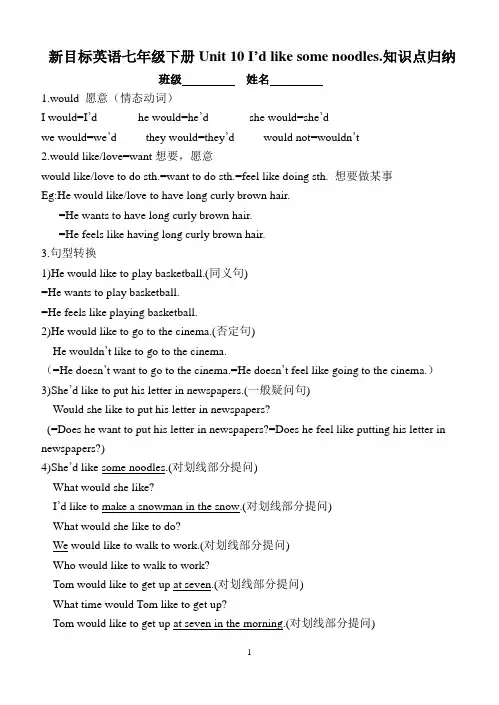
新目标英语七年级下册Unit 10 I’d like some noodles.知识点归纳班级姓名1.would 愿意(情态动词)I would=I’d he would=he’d she would=she’dwe would=we’d they would=they’d would not=wouldn’t2.would like/love=want想要,愿意would like/love to do sth.=want to do sth.=feel like doing sth. 想要做某事Eg:He would like/love to have long curly brown hair.=He wants to have long curly brown hair.=He feels like having long curly brown hair.3.句型转换1)He would like to play basketball.(同义句)=He wants to play basketball.=He feels like playing basketball.2)He would like to go to the cinema.(否定句)He wouldn’t like to go to the cinema.(=He doesn’t want to go to the cinema.=He doesn’t feel like going to the cinema.)3)She’d like to put his letter in newspapers.(一般疑问句)Would she like to put his letter in newspapers?(=Does he want to put his letter in newspapers?=Does he feel like putting his letter in newspapers?)4)She’d like some noodles.(对划线部分提问)What would she like?I’d like to make a snowman in the snow.(对划线部分提问)What would she like to do?We would like to walk to work.(对划线部分提问)Who would like to walk to work?Tom would like to get up at seven.(对划线部分提问)What time would Tom like to get up?Tom would like to get up at seven in the morning.(对划线部分提问)When would Tom like to get up?He’d like to play basketball at school.(对划线部分提问)Where would he like to play basketball?I’d like to see the giraffes. Because they are smart.(对划线部分提问)Why would you like to see the giraffes?I would like to go to school on foot.(对划线部分提问)How would you like to go to school?They’d like two potatoes.(对划线部分提问)How many potatoes would they like?They’d like a little milk.(对划线部分提问)How much milk would they like?I’d like a medium bowl of noodles.(对划线部分提问)What size bowl of noodles would you like?I’d like some beef and tomato noodles. (对划线部分提问)What kind of noodles would you like?5)I’d like some beef and potato noodles.(同义句)=I’d like some noodles with beef and potatoes.How old are you?(同义句)=What’s your age?6)Can you tell me? What does he want?(合并句子)Can you tell me what he wants?4.Would you like some noodles? 你想要一点面条吗?Yes,please. 是的。
(完整版)新版新目标英语七年级下册unit2知识点总结
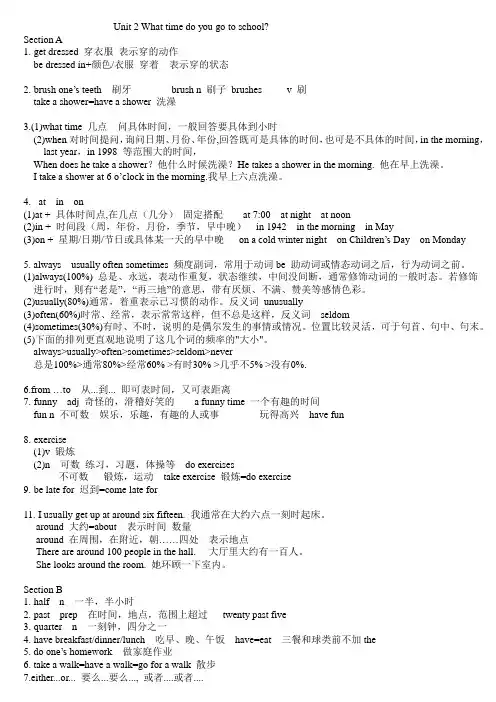
Unit 2 What time do you go to school?Section A1.get dressed 穿衣服表示穿的动作be dressed in+颜色/衣服穿着表示穿的状态2.brush one’s teeth 刷牙brush n 刷子brushes v 刷take a shower=have a shower 洗澡3.(1)what time 几点问具体时间,一般回答要具体到小时(2)when对时间提问,询问日期、月份、年份,回答既可是具体的时间,也可是不具体的时间,in the morning,last year,in 1998 等范围大的时间,When does he take a shower?他什么时候洗澡?He takes a shower in the morning. 他在早上洗澡。
I take a shower at 6 o’clock in the morning.我早上六点洗澡。
4.at in on(1)at + 具体时间点,在几点(几分)固定搭配at 7:00 at night at noon(2)in + 时间段(周,年份,月份,季节,早中晚)in 1942 in the morning in May(3)on + 星期/日期/节日或具体某一天的早中晚on a cold winter night on Children’s Day on Monday5. always usually often sometimes 频度副词,常用于动词be 助动词或情态动词之后,行为动词之前。
(1)always(100%) 总是、永远,表动作重复,状态继续,中间没间断,通常修饰动词的一般时态。
若修饰进行时,则有“老是”,“再三地”的意思,带有厌烦、不满、赞美等感情色彩。
(2)usually(80%)通常,着重表示已习惯的动作。
反义词unusually(3)often(60%)时常、经常,表示常常这样,但不总是这样,反义词seldom(4)sometimes(30%)有时、不时,说明的是偶尔发生的事情或情况。
七年级英语人教版(新目标)(最新版)下学期期末复习:知识点归纳
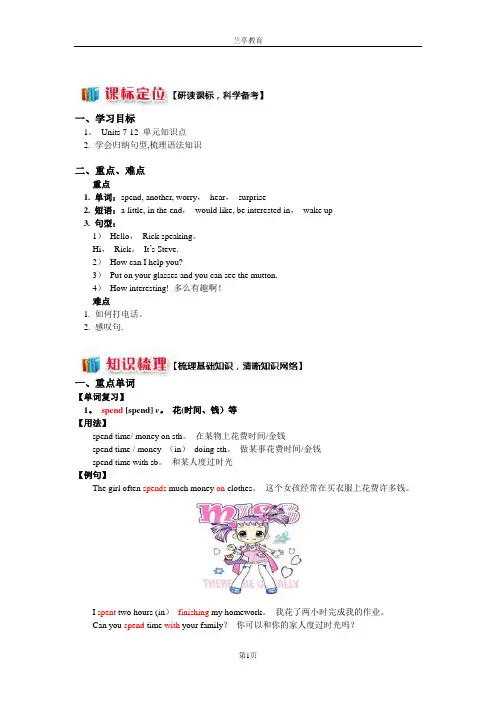
一、学习目标1。
Units 7-12 单元知识点2. 学会归纳句型,梳理语法知识二、重点、难点重点1. 单词:spend, another, worry,hear,surprise2. 短语:a little, in the end,would like, be interested in,wake up3. 句型:1)Hello,Rick speaking。
Hi,Rick。
It’s Steve.2)How can I help you?3)Put on your glasses and you can see the mutton.4)How interesting! 多么有趣啊!难点1. 如何打电话。
2. 感叹句.一、重点单词【单词复习】1。
spend [spend] v。
花(时间、钱)等【用法】spend time/ money on sth。
在某物上花费时间/金钱spend time / money (in)doing sth。
做某事花费时间/金钱spend time with sb。
和某人度过时光【例句】The girl often spends much money on clothes。
这个女孩经常在买衣服上花费许多钱。
I spent two hours (in)finishing my homework。
我花了两小时完成我的作业。
Can you spend time with your family?你可以和你的家人度过时光吗?【拓展】(1) pay常用来表示“付款”,主语是人,其后用介词for。
sb。
pays money for sth. = sb。
spends money on/ doing sth。
(2)cost 表示“花钱”,主语为物。
sth。
costs sb. money. = sb. pays money for sth。
= sb。
spends money on/(in)doing sth。
七年级下册英语知识点复习(完整版)
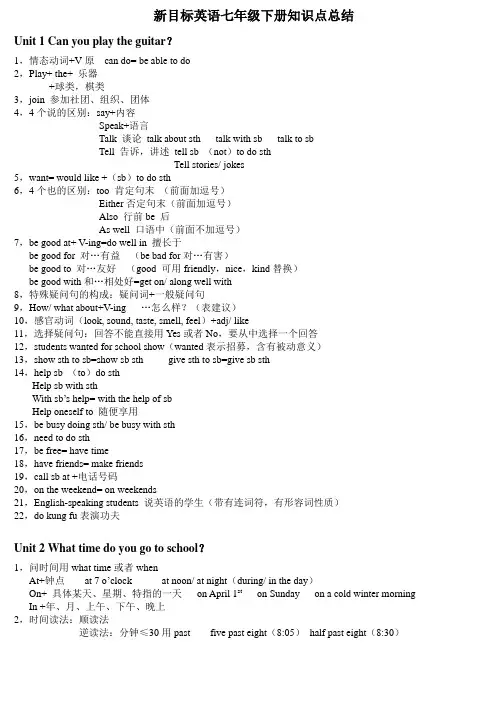
新目标英语七年级下册知识点总结Unit 1 Can you play the guitar?1,情态动词+V原can do= be able to do2,Play+ the+ 乐器+球类,棋类3,join 参加社团、组织、团体4,4个说的区别:say+内容Speak+语言Talk 谈论talk about sth talk with sb talk to sbTell 告诉,讲述tell sb (not)to do sthTell stories/ jokes5,want= would like +(sb)to do sth6,4个也的区别:too 肯定句末(前面加逗号)Either否定句末(前面加逗号)Also 行前be 后As well 口语中(前面不加逗号)7,be good at+ V-ing=do well in 擅长于be good for 对…有益(be bad for对…有害)be good to 对…友好(good 可用friendly,nice,kind替换)be good with和…相处好=get on/ along well with8,特殊疑问句的构成:疑问词+一般疑问句9,How/ what about+V-ing …怎么样?(表建议)10,感官动词(look, sound, taste, smell, feel)+adj/ like11,选择疑问句:回答不能直接用Yes或者No,要从中选择一个回答12,students wanted for school show(wanted表示招募,含有被动意义)13,show sth to sb=show sb sth give sth to sb=give sb sth14,help sb (to)do sthHelp sb with sthWith sb’s help= with the help of sbHelp oneself to 随便享用15,be busy doing sth/ be busy with sth16,need to do sth17,be free= have time18,have friends= make friends19,call sb at +电话号码20,on the weekend= on weekends21,English-speaking students 说英语的学生(带有连词符,有形容词性质)22,do kung fu表演功夫Unit 2 What time do you go to school?1,问时间用what time或者whenAt+钟点at 7 o’clock at noon/ at night(during/ in the day)On+ 具体某天、星期、特指的一天on April 1st on Sunday on a cold winter morning In +年、月、上午、下午、晚上2,时间读法:顺读法逆读法:分钟≤30用past five past eight(8:05)half past eight(8:30)分钟>30用to a quarter to ten(9:45)整点用…o’clock 7 o’clock(7:00)3,3个穿的区别:wear 表状态,接服装、手套、眼镜、香水等Put on 表动作,接服装Dress 表动作,接sb/ oneself get dressed穿衣3,感叹句:How+adj+主谓!How+adj+a/an +n单+主谓!What+ a/an +adj+ n单+主谓!What+ adj+ n复/ 不可数+主谓!4,from…to…5,be/ arrive late for6,频度副词(行前be 后)Always usually often sometimes seldom hardly never7,一段时间前面要用介词for for half an hour for five minutes8,eat/ have…for breakfast/ lunch/ dinner/ supper9,either…or10,a lot of=lots of11,it is +adj+for sb +to do sth (adj修饰to do sth)It is important for me to learn English.it is +adj+of sb +to do sth (adj修饰sb)It is kind/ friendly/ nice of you to help me.Unit 3 How do you get to school?1,疑问词How 如何(方式)how long 多长(时间)答语常用“(For/ about +)时间段”how far多远(距离)答语常用“(It’s +)数词 +miles/ meters/ kilometers”how often多久一次(频率)答语常用“Always/ often/ every day/…”或“次数+时间”等表频率的状语How soon多快,多久以后,常用在将来时中。
新版新目标英语七年级下册知识点总结
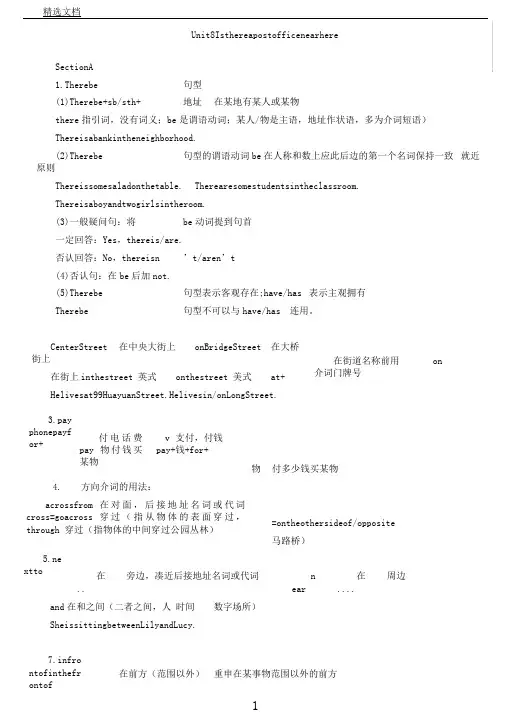
Unit8IsthereapostofficenearhereSectionA1.Therebe 句型(1)Therebe+sb/sth+ 地址在某地有某人或某物there指引词,没有词义;be是谓语动词;某人/物是主语,地址作状语,多为介词短语)Thereisabankintheneighborhood.(2)Therebe 句型的谓语动词be在人称和数上应此后边的第一个名词保持一致就近原则Thereissomesaladonthetable. Therearesomestudentsintheclassroom.Thereisaboyandtwogirlsintheroom.(3)一般疑问句:将be动词提到句首一定回答:Yes,thereis/are.否认回答:No,thereisn ’t/aren’t(4)否认句:在be后加not.(5)Therebe 句型表示客观存在;have/has 表示主观拥有Therebe 句型不可以与have/has 连用。
CenterStreet 在中央大街上onBridgeStreet 在大桥街上在街上inthestreet 英式onthestreet 美式at+ Helivesat99HuayuanStreet.Helivesin/onLongStreet.在街道名称前用介词门牌号on3.payphonepayf or+付电话费pay物付钱买某物v支付,付钱pay+钱+for+物付多少钱买某物4.方向介词的用法:acrossfrom在对面,后接地址名词或代词cross=goacross穿过(指从物体的表面穿过,through穿过(指物体的中间穿过公园丛林)=ontheothersideof/opposite马路桥)5.nextto在..旁边,凑近后接地址名词或代词near在....周边and在和之间(二者之间,人时间数字场所)SheissittingbetweenLilyandLucy.7.infrontofinthefrontof在前方(范围以外)重申在某事物范围以外的前方在..前方(范围以内)重申在某事物范围内的前方me打搅了,对不起屈驾因咨询事情,打搅他人而表示抱歉时的用语,常用在问路以前。
《新目标英语》七年级下册重点句型、短语归纳(2)
Unit 8 I’d like some noodles.Ⅰ、Useful expressions:1. I’d like = I would like 我想要2. what kind of … 哪种……3. beef and tomato noodles 牛肉西红柿面4. what size bowl of … 多大碗的……5. he’d like = he would like 他想要6. a small/medium/large bowl of … 一份儿小碗的/ 中号的/ 大碗的……7. a large glass of orange juice一大杯橙汁8. green tea/black tea绿茶/红茶9. at the House of Dumplings 饺子馆10. have some great specials 有些很棒的特色餐11. lunch special 特色午餐12. get dumplings 吃饺子13. strawberry and banana ice cream 草莓香蕉冰淇淋14. a small orange juice 一小杯桔子汁儿15. a bowl of beef and tomato noodles 一碗番茄牛肉面16. what size of dessert 多大尺寸的甜品17. order sth. 点(菜或者饮料……)Ⅱ、Sentences:1. I’d like some noodles . 我想要点面条。
2.What kind of noodles would you like? 你想要哪种面条?3.What size bowl of noodles would you like? 你想要多大碗的面条?I’d like a small/medium/large size bowl. 我想要一小/中/大碗。
4. What kind of noodles do you have? 你这儿有哪种面条?3.What size do you have? 你这儿有多大份儿的?4.I like … and …我喜欢……和……5.I don’t like … or … 我不喜欢……和……6.Special 1 has beef and onions. 一号特色餐有牛肉和洋葱。
新目标(Go for it)版七年级英语下册各单元知识点总结
新目标(Go for it)版七年级英语下册各单元知识点总结人教版初一英语下册各单元知识点总结Unit 1 Can you play the guitar?一、 单词与词组表示“参加,加入”,此处指参加社团或组织,成为其中的成员。
Join the army 参军 join the NBA 加入美国篮球协会Join the art/sports/music/English/chess club 参加体育/音乐/英语/象棋俱乐部play soccer/ basketball/volleyball/football/tennis/badminton / 篮球 / 排球 /英式足球,美式橄榄球/网球/羽毛球)Be good at+ sth./doing sth. 擅长做某事Be good with sb 与…相处得好Be good to sb …友好=be friendly toBe good for 对…有好处特指某一次的动作;like doing sth. 强调经常性的爱好。
两者都表示喜讲故事 tell sb. sth. /to do sth. /not to do sth.告诉某人某事/不要做某帮助某人做某事Help yourself/sb. (to sth.)把某物(尤其是指食物,饮料等)拿给自己/某人e.g. Call Mr.Brown at 293-7742意思是“回家”,“到家”。
前面不加介词。
这里的home 是e.g. 1)When do you go home every day?你每天什么时候回家? 2)He drives home after work.他下班的开车回家。
3)She often does some shopping on his way home. 她经常在回家途中买些东西。
2. at home 表示静态概念。
意思是“在家”。
这里的home 是名词,表示具体地点。
新目标英语七年级(下)Unit 1知识要点归纳
gui t ar 吉他s i ng 唱歌s wi m 游泳dance 跳舞dr aw 画ches s 国际象棋s peak 说(某种语言);说话j oi n 参加,加入cl ub 俱乐部,社团t el l 讲述;告诉wr i t e 写作;写字pi ano 钢琴dr um 鼓vi ol i n 小提琴m us i ci an 音乐家t al k 谈话s how演出;表演j oi n t he ar tcl ub 参加美术小组/俱乐部pl ay t he gui t ar 弹吉他t el l s t or i es 讲故事be good w i t h...和……相处很好;善于应付……m ake f r i ends 结交朋友be good at ...擅长于……hel p s b.wi t h st h.在某方面帮助某人on t he weekend 在周末1.I want t o j oi n t he ar t cl ub.我想参加美术俱乐部。
wantt o do s t h.想做某事例如:I w ant t o go t o t he z oo t hi s Sat ur day.我想这周六去动物园。
2.C al l M r .B r ow n at 293-7742.拨打293-7742找布朗先生。
cal ls b.at ...拨打……找某人例如:Pl eas e cal l ourm anager at 512-3423.请拨打512-3423找我们的经理。
情态动词can 的用法can 表示“能够做某事”,也可以表示请求。
其否定式为can ’t,表示“不能够做某事”,或者表示推测,意为“不可能”。
例如:1.Can you be her e at s i x o ’cl ock t om or r ow m or ni ng?(表请求)你明天早上6点到这里可以吗?2.I can ’tgo s hoppi ng wi t h you t oday.(表示“不能够”)我今天不能陪你去购物。
初中人教新目标英语目录及知识点梳理
初中人教新目标英语目录及知识点梳理一、七年级上册1. Unit 1 Hello!重点知识点:问候语、介绍自己、问别人的名字及所在国籍2. Unit 2 This is my sister.重点知识点:指示代词、人称代词、名词所有格、形容词性物主代词3. Unit 3 Is this your pencil?重点知识点:物主代词、一般疑问句、选择疑问句、名词性物主代词4. Unit 4 How old are you?重点知识点:数字、年龄表达、询问年龄、数字词语表达法5. Unit 5 Do you have a soccer ball?重点知识点:物品的拥有、询问人是否有物、常见运动器材的词汇二、七年级下册1. Unit 1 Where did you go on vacation?重点知识点:一般过去式、过去式的构成、问对方去过哪里度假2. Unit 2 How often do you exercise?重点知识点:频率副词、询问人的运动频率、回答频率的方法3. Unit 3 What are you doing for vacation?重点知识点:现在进行时、将来时、练习关于度假活动的对话4. Unit 4 I want to be an actor.重点知识点:职业相关词汇、介绍自己的职业梦想、询问对方的职业梦想5. Unit 5 Do you want to watch a game show?重点知识点:表示愿望和意愿的动词短语、邀请别人做事、回答邀请的方法三、八年级上册1. Unit 1 How do you study for a test?重点知识点:询问他人学习方法、回答他人学习方法、谈论自己的学习方法2. Unit 2 I used to be afraid of the dark.重点知识点:used to句型的用法、谈论过去的变化与习惯3. Unit 3 What were you doing when the UFO arrived?重点知识点:过去进行时、询问过去的情况、谈论过去正在进行的活动4. Unit 4 I wanted to be an actress.重点知识点:过去的愿望与打算、表示过去的动词形式、谈论过去的梦想与打算5. Unit 5 What's the highest mountain in the world?重点知识点:地理相关词汇、谈论地理事物、描述自然地理特征四、八年级下册1. Unit 1 How often do you exercise?重点知识点:谈论自己的健康习惯、询问别人的健康习惯、回答健康习惯的问题2. Unit 2 I think that mooncakes are delicious.重点知识点:表达个人观点的句型、谈论个人观点、询问他人观点3. Unit 3 What were you doing when it started to rain?重点知识点:过去进行时与过去时的区分、谈论过去的活动与情况4. Unit 4 He said I was hard-working.重点知识点:间接引语、直接引语转述、谈论他人的言论5. Unit 5 It must belong to Carla.重点知识点:情态动词must、可能性的推测、推测物的归属五、九年级上册重点知识点:谈论学习方法、提出建议、回应建议2. Unit 2 I think that reading is boring.重点知识点:表达个人观点的句型、谈论个人观点、询问他人观点重点知识点:将来时态的构成、谈论未来事物、预测未来技术4. Unit 4 What would you do?重点知识点:与条件虚拟语气相关的动词短语、假设句型的构成、谈论虚拟情况5. Unit 5 Nelson Mandela-a modern hero重点知识点:人物介绍、描述人物特点、探讨社会问题以上是初中人教新目标英语的目录及部分重要知识点的梳理。
- 1、下载文档前请自行甄别文档内容的完整性,平台不提供额外的编辑、内容补充、找答案等附加服务。
- 2、"仅部分预览"的文档,不可在线预览部分如存在完整性等问题,可反馈申请退款(可完整预览的文档不适用该条件!)。
- 3、如文档侵犯您的权益,请联系客服反馈,我们会尽快为您处理(人工客服工作时间:9:00-18:30)。
教材目录Unit 1 Can you play the guitarUnit 2 What time do you go to schoolUnit 3 How do you get to schoolUnit 4 Don’t eat in ClassUnit 5 Why do you like pandasUnit 6 I’m watching TVUnit 7 It’s rainingUnit 8 IS there a post office near hereUnit 9 What does he look likeUnit 10 Id Like some noodlesUnit 11 How was your school tripUnit 12 What did you do last weekendUnit1 Can you play the guitar?一、短语归纳1. play chess 下国际象棋2. play the guitar 弹吉他3. speak English 说英语4. English club 英语俱乐部5. talk to 跟…说6. play the violin 拉小提琴7. play the piano 弹钢琴8. play the drums 敲鼓9. make friends 结交朋友10. do kung fu 练(中国) 功夫11. tell stories 讲故事12. play games 做游戏13. on the weekend/on weekends 在周末二、用法集萃1. play +棋类/球类下…棋/打…球2. play the +西洋乐器弹/拉…乐器3. be good at doing sth.= do well in doing sth. 擅长做某事4. be good with sb. 和某人相处地好5. need sb. to do sth. 需要某人做某事6. can + 动词原形能/会做某事7. a little + 不可数名词一点儿…8. join the…club 加入…俱乐部9. like to do sth. =love to do sth. 喜欢/喜爱做某事三、典句必背1. —Can you draw? 你会画画吗?—Yes, I can./No, I can’t. 是的,我会。
/不,我不会。
2. —What club do you want to join? 你想加入哪个俱乐部?—I want to join the chess club. 我想加入国际象棋俱乐部。
3. You can join the English club. 你可以加入英语俱乐部。
4. Sounds good./That sounds good. 听上去很好。
5. I can speak English and I can also play soccer. 我会说英语也会踢足球。
6. Please call Mrs. Miller at 555-3721. 请给米勒夫人拨打电话555-3721。
四、话题写作主题:介绍自己特长/强项Dear Sir,I want to join your organization (组织) to help kids with sports, music and English.My name is Mike. I am 15 years old. I'm a student in No. 1 Middle school. I can play the guitar well. I can sing many songs. I can swim and speak English well, too. I think I can be good with the kids. I also do well in telling stories.I hope to get your letter soon.Yours,MikeUnit2 What time do you go to school?一、短语归纳1. what time 几点2. go to school 去上学3. get up 起床4. take a shower 洗淋浴5. brush teeth 刷牙6. get to 到达7. do homework 做家庭作业8. go to work 去上班9. go home 回家10. eat breakfast 吃早饭11. get dressed 穿上衣服12. get home 到家13. either…or…要么…要么…14. go to bed 上床睡觉15. in the morning/afternoon/evening 在上午/下午/晚上16. take a walk 散步17. lots of=a lot of 许多,大量18. radio station 广播电台19. at night 在晚上20. be late for=arrive late for 迟到二、用法集萃1. at + 具体时间点在几点(几分)2. eat breakfast/lunch/dinner 吃早饭/午饭/晚饭3. thirty/half past +基数词…点半4. fifteen/a quarter to +基数词差一刻到…点5. take a/an+名词从事…活动6. from…to…从…到…7. need to do sth. 需要做某事三、典句必背1. —What time do you usually get up? 你通常几点钟起床?—I usually get up at six thirty. 我通常6:30起床。
2. That’s a funny time for breakfast. 那是个有趣的早餐时间。
3. —When do students usually eat dinner?学生们通常什么时候吃完饭?—They usually eat dinner at a quarter to seven in the evening.他们通常在晚上6:45吃晚饭。
4. In the evening, I either watch TV or play computer games.在晚上,我要么看电视,要么玩电脑游戏。
5. At twelve, she eats lots of fruit and vegetables for lunch.在十二点,她午餐吃很多水果和蔬菜。
6. She knows it’s not good for her, but it tastes good.她知道它对她没好处,但是尝起来很好。
7. Here are your clothes. 这是你的衣服。
四、话题写作主题:谈论日常作息习惯My School DayI am a student. I usually get up at seven, and I eat breakfast at seven thirty. Then I go to school at eight. School starts at eight thirty. I eat lunch at twelve. I go home at 17:00. I often eat dinner at 19:00 and then play the piano. I do my homework at 20:00. At 22:00, I go to bed.Unit3 How do you get to school?一、短语归纳1. get to school 到达学校2. take the subway 乘地铁3. ride a bike 骑自行车4. how far 多远5. from home to school 从家到学校6. every day 每天7. take the bus 乘公共汽车8. by bike 骑自行车9. bus stop 公共汽车站10. think of 认为11. between…and…在…和…之间12. one 11-year-old boy 一个11岁的男孩13.play with…和…玩14. come true 实现15. have to 不得不二、用法集萃1. take…to…= go to…by…乘…去…2. How do/does sb. get to…? 某人是怎样到…的?3. How far is it from…to…? 从…到…有多远?4. It takes sb. some time to do sth. 做某事花费某人多长时间。
5. How long does it take to do sth.? …花费多长时间?6. It is + adj. + to do sth. 做某事是…7. Thanks for + n./Ving 感谢你(做)某事。
三、典句必背1. —How do you get to school? 你怎么去上学?—I ride my bike. 我骑自行车。
2. How far is it from your home to school?从你家到学校有多远?3. How long does it take you to get to school?去上学花费你多久?4. For many students, it is easy to get to school.对很多学生来说,很容易到达学校。
5. There is a very big river between their school and the village.在他们学校和村庄之间有一条很大的河流。
四、话题写作主题:上学的交通方式写作思路:②开篇点题:点出自己的出行方式;②具体内容:自己选择这种交通方式的原因;③结束语: 表明自己的观点。
The Best Way for Me to Go to SchoolDifferent students go to school in different ways in our school, but I like to go to school on foot.First, I live near the school, so my home is not far from my school. And it takes me a few minutes to get there. Second, there is a crossing on my way to school, and sometimes the traffic is very busy.I think it is safer to go to school on foot. Third, I think walking is good for my health. It’s a kind of sport and it makes me study better.So in my opinion, the best way to go to school is on foot. What about you?Unit4 Don’t eat in class.一、短语归纳1. on time 准时,按时2. listen to…听……3. in class 在课上4. be late for 做……迟到5. have to 不得不6. be quiet 安静7. go out 外出8. do the dishes 清洗餐具9. make breakfast 做早饭10. make (one’s) bed 铺床11. be noisy 吵闹12. keep one’s hair short 留短发13. play with sb. 和某人一起玩14. play the piano 弹钢琴15. have fun 玩得高兴16. make rules 制订规则二、用法集萃1. Don’t + 动词原形+其他。
